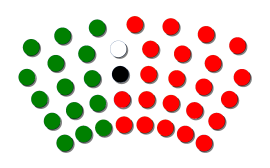- Fecha(s): 10/05/2019
- Lugar: Seminario del Departamento de Métodos Cuantitativos para la Economía y Empresa, UMU. Retransmisión en directo.
- Ponente: Santiago Rubio. Universidad de Valencia

Abstract: This paper studies the impact of adaptation on the stability of an international emission agreement. To address this issue we solve a three-stage coalition formation game where in the first stage countries decide whether or not to sign the agreement. Then, in the second stage, signatories (playing together) and non-signatories (playing individually) select their…
- Fecha(s): 04/04/2019
- Lugar: Seminario del Departamento de Métodos Cuantitativos para la Economía y Empresa, UMU. Retransmisión en directo.
- Ponente: Francisco Cabo. Universidad de Valladolid

The paper analyzes the interaction between individuals belonging to two distinct populations, who share the same strategy set but differ in their payoff matrices. A two-population evolutionary game describes this interaction, that presents a double dimension. On the one hand, agents in one population play a game against individuals within their own and also the…
- Fecha(s): 05/04/2019
- Lugar: Aula Martínez Gallur
- Ponente: José Carlos González Pimienta (Universidad Carlos 3 de Madrid)

We test the turnout predictions of the canonical costly voting model through a large-scale, real effort experiment. We recruit 1,200 participants through Amazon’s Mechanical Turk and employ a 2 x 2 between subjects design encompassing small ( N = 30) and large ( N = 300) elections, as well as close and lopsided. As predicted,…
- Fecha(s): 28/02/2019
- Lugar: Sala de Seminarios del CIO (Edificio Torretamarit).Universidad Miguel Hernández (Campus de Elche). Se grabará.
- Ponente: Juan de Dios Moreno Ternero (Universidad Pablo de Olavide de Sevilla)

Abstract: We consider the problem of sharing the revenues from broadcasting sport league events, introduced by Bergantiños and Moreno-Ternero (2019). We characterize a family of rules compromising between two focal and somewhat polar rules: the equal-split rule and concede-and-divide. The characterization only makes use of three basic axioms: equal treatment of equals, additivity and maximum…
- Fecha(s): 26/10/2018
- Lugar: Seminario del Departamento de Métodos Cuantitativos para la Economía y Empresa, UMU. Retransmisión en directo.
- Ponente: Ana B. Ania-Martínez. University of Vienna

Abstract: We explore the role of public funds sharing in the framework of laboratory federalism, viewed as a learning process of policy innovation and imitation. In a model of decentralized, rich-to-poor redistribution with labor mobility, such a learning dynamics leads to the complete erosion of the welfare state. We show that suitably designed funds sharing schemes can correct this…
- Fecha(s): 04/06/2018
- Lugar: Sala Seminarios, Edificio Torretamarit, Uiversidad Miguel Hernández de Elche. Se grabará.
- Ponente: Ricardo Martínez (Universidad de Granada)

We study the problem of dividing a budget among the districts of a city taking into account their population and wealth. We focus on order preservation properties that ensure higher transfers to those districts with larger populations and, at the same time, introduce a policy redistribution so that districts with lower wealth per capita obtain…
- Fecha(s): 22/05/2018
- Lugar: Sala Seminarios, Edificio Torretamarit, Uiversidad Miguel Hernández de Elche. Retransmisión en directo.
- Ponente: Greys Sosic, USC Marshall School of Business, USA

In view of the urgency and challenges of mitigating climate change, it should be noted that Greenhouse Gas (GHG) emitted from the supply chains of the 2,500 largest global corporations accounts for about 18% of global GHG emissions. Therefore, rationalizing emissions in supply chains could make a significant contribution to achieving the CO2 emission reduction…
- Fecha(s): 09/03/2020
- Lugar: Seminario de Fundamentos del Análisis Económico (aula amarilla, torre C, segunda planta)
- Ponente: Juan José Ganuza
- Porconfirmar: 1

CANCELADO POR ENFERMEDAD DEL PONENTE. SE AVISARÁ CUANDO SE FIJE OTRA POSIBLE FECHA. ABSTRACT Relevant empirical findings point at the actual use of explicit (but imperfectly en- forceable) formal contracts by businesses alongside substantial informal dimensions in the relationship. In this paper we formally show the supporting role that formal contracts play for relational interactions. …
- Fecha(s): 23/02/2018
- Lugar: Seminario del Departamento de Métodos Cuantitativos para la Economía y Empresa, UMU. Retransmisión en directo.
- Ponente: David Jiménez Gómez. Universidad de Alicante

ABSTRACT. Temptation and self-control evolved as single mechanism to make humans behave against their own self-interest. I follow a recent literature in Economics on the evolution of preferences, by modeling the evolution of self-control in a principal-agent framework. The principal can obtain the first best asymptotically by biasing the utility of the agent (from which…
- Fecha(s): 17/11/2017
- Lugar: Sala de Seminarios (Edificio Torretamarit), Universidad Miguel Hernández (Campus de Elche) . Se emitirá en directo o se grabará.
- Ponente: Fernando Bernstein (Fuqua School of Business, Duke University, USA)

Abstract We consider an online retailer facing heterogeneous customers with initially unknown product preferences. Customers are characterized by a diverse set of demographic and transactional attributes. The retailer can personalize the customers’ assortment offerings based on available profile information to maximize cumulative revenue. To that end, the retailer must estimate customer preferences by observing transaction…











